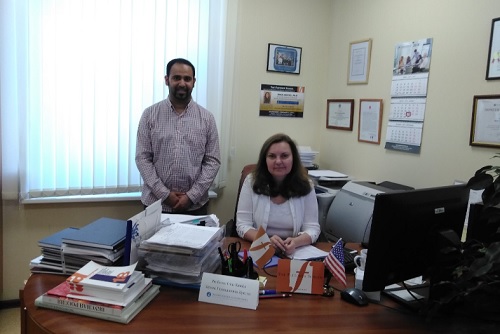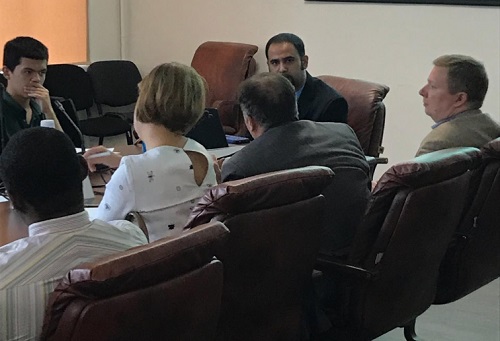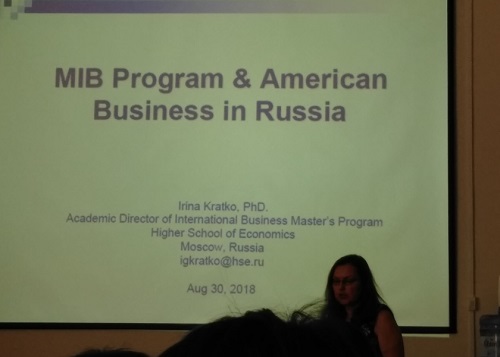Reflections on HSE University Exchange and U.S.-Russian Student Dialogue
By Parv Aggarwal, MIB 2019 Candidate, The Fletcher School
Introduction
I am a second-year Fletcher MIB student who is doing an exchange with the National Research University Higher School of Economics (HSE University) in Moscow this semester. Ever since HSE’s MIB program was created in 2011 in a partnership with Fletcher, HSE has sent two of its MIB students on exchange to Fletcher each fall. Last semester, for the first time, Fletcher formalized a reciprocal agreement to allow its students to participate in an exchange semester with HSE’s MIB program. I am the first guinea pig for this reverse exchange and hope to use this opportunity to further both academic relationships and mutual understanding between Americans and Russians at a time of arguably the highest tensions since the Cold War. In addition to taking a full-time course load, I also hope to use the academic access made possible by this exchange to pursue my research on how U.S. sanctions are making Russia more resilient.
First Impressions
I was warned about everything from “high hostility toward Americans” and “blatant racism” to “lacking basic amenities” and “high-crime-prone streets and public transportation” prior to coming to Moscow. Russia is designated as Level 3 on the U.S. Department of State’s Travel Advisories list of countries, and consequently I had to obtain a detailed travel review from the Tufts Travel Registry. International SOS sent me a security assessment of Moscow that was more than 15 pages long. Reading it and providing detailed risk minimization plans naturally made me at least somewhat apprehensive and wary about this new environment I was about to enter.
Slowly but surely, Moscow has blown those apprehensions into oblivion, one by one. From immigration to daily dealings, Moscow keeps pleasantly surprising me. From a combination of anecdotes, travel warnings, and the fact that U.S. embassies and consulates in Russia have been giving Russian residents a hard time with visa entries recently, I was expecting to be pulled aside for heavy questioning as an American citizen crossing the Russian border. But lo and behold, nothing. Literally no questions. The border guard simply scanned my passport and visa, generated a migration card, made an entry stamp, smiled, and said, “Welcome to Russia.”
It was mostly all smooth sailing from there. The Aeroexpress train from the airport took me straight to the city center, where I met my HSE host, took a cab, and checked in to the HSE dorm. I was intrigued by a few peculiarities I noticed in pedestrian crossings to make life more convenient and straightforward. All major intersections with multi-lane highways in Moscow have underground pedestrian crossings, and all other intersections have timers indicating not only the time left to cross the street but also the time remaining until the next pedestrian crossing.
Not being nearly as caught up with learning Russian as I had hoped to be at this point, of course, I am inevitably missing out on the full experience of the city. Roughly 30 percent of Moscovites speak English. Most HSE students and faculty speak English, but the dorm staff do not, which has made for some interesting exercises in non-verbal communication and over-reliance on Google Translate’s voice feature. The public transportation staff understand English to some extent but largely do not speak it, which means that if you ask a question in English, you will typically get a response in Russian. The same usually happens when asking for directions around the city. During the FIFA World Cup this summer, metro signage in English was considerably expanded, which I am certainly thankful for.
Speaking of the metro system, I have found it to be incredibly reliable and efficient. The metro stations here, most of them built in the Soviet era, are meant to double as bomb shelters and hence are not only sturdy works of architecture but also filled with art, sculptures, and cultural artifacts. The metro stations have some of the longest escalators I have ever seen and thus the “stand on the right, walk on the left” rule is followed strictly by everyone. The metro trains themselves are also some of the fastest I have ever ridden, though I do wish they were somewhat quieter.
From the shopkeepers and street vendors to the general public and even children I have encountered, Russians are anything but the often stereotyped “cold” people I was expecting. No one should expect to instantly become friends with anyone they meet, but I can say with certainty that, as a foreigner, my interactions with strangers in Moscow have always been polite, pleasant, and respectful. Folks here genuinely care about assisting you with whatever you might be stuck with. Moreover, Russians who speak English do initiate conversations and try to get to know you. Among those who do not speak English, Russian babushkas (grandmas) often initiate friendly conversations and ask innocent questions in Russian, which makes me want to become fluent faster. The cautions I was given about interacting with Russians, from “Russians do not talk to strangers” and “Russians do not smile” to “there is no customer service culture in Russia,” have all been unfounded. I was told not to smile at all. On the contrary, I have noticed that a smile on my part goes a long way in establishing mutual trust and respect.
To elaborate, let me discuss how my “elephant in the room” brown skin and American citizenship was received. Of course, everyone I converse with asks me where I am from and naturally learns from the outset that I am American. Contrary to my expectations, that has neither been a conversation killer nor a trigger for combative questioning about deteriorating U.S.-Russia relations. What I instead tend to get to my pleasant surprise is, “Cool! Where in the U.S. are you from?” to which I naturally explain being from North Carolina and going to graduate school in Boston. What usually follows next is a conversation about football and basketball. More people here know about the Duke-UNC NCAA rivalry than in Boston. Being an American is a normal thing here apparently. Of course, not being Caucasian, I am often asked, “Where are you from originally?” and a similar conversation follows about India. Contrary to the racism I was warned about, folks here are quite culturally sensitive, educated, nuanced, respectful, and genuinely interested in getting to know you without asking you to explain the policies of your government.
My new Russian friends tell me that my positive experiences here may be a unique feature of Moscow and may not hold true throughout the country. All in all, the vibe here seems relatively modern, with a distinct cultural backbone throughout society. Folks here are largely on the same cultural frequency, and I am hard pressed to sense any social discord so far here. Of course, I have only been in Moscow for two weeks and cannot speak for the rest of Russia, which I hope to visit more of during my time here. But if my experience so far is any indicator, I would not be surprised to keep getting pleasantly surprised.
U.S.-Russia Relations Conference
I was fortunate enough to learn about in advance, apply for, and be selected to participate and present in HSE’s third annual international student conference “U.S.-Russian Student Dialogue.” The event, held last week, was my first academic experience at HSE, as classes began this week. The conference, co-sponsored by the Ivy Council and HSE, invited both Russian and American scholars to present their research on key topics in U.S.-Russia relations and their global impact and included many additional presentations by HSE faculty and students on aspects of academic collaboration between our two countries.
Professor Irina Kratko, director of HSE’s MIB program, notably gave a presentation on the collaborative origins of the program, how it is expanding collaboration between American corporations in Russia and HSE, and how those corporations continue to grow despite sanctions, which I found to be extremely interesting and reassuring. Student club leaders from HSE presented on how they rigorously prepare their colleagues to obtain employment with American firms in consulting and finance, with case interview preparation and finance competitions, much like our Fletcher counterparts.
The delegates’ presentations were very diverse, including a big data analysis of attitudes in the U.S. Congress toward Russia, an econometric study of the role of external party influence in civil wars, and a refutation of the notion that Russia is a “bad actor” in Eastern Europe. Though there were differing opinions on controversial topics such as regional conflicts and election interference, all debates were substantive, civil, and productive for fostering mutual understanding. HSE professors’ remarks were very pragmatic and grounded in reality. They were always open to direct criticism and provided critical feedback to student presenters in turn.
I had the opportunity to present my research proposal on Russia’s ability to raise capital in light of U.S. sanctions. I did a case study of Russia’s strategic domestic and international initiatives to avoid exposure to U.S. financial hegemony and called for risk and resiliency metrics to be expanded beyond the standard sovereign credit rating metrics used in order to more accurately capture the true nature of Russia’s current fundamental process changes. My presentation was well received by HSE faculty, and I was given positive feedback and suggestions about further resources to dig into.
During the conference breaks, I had a chance to interact with participants and exchange perspectives on where U.S.-Russia relations are headed in the short and long term. The general consensus was that “it is going to get worse before it gets better.” The Russian perspective is that the United States does not treat Russia as an equal partner, does not rely on evidence before delivering verdicts and punishments, and recently tends to abuse its dominance in the world to deliberately harm and isolate Russia. Russia still has some hope left for fairer treatment, but as that hope keeps getting harder to sustain, it seeks new partners to counter American political and economic hegemony.







